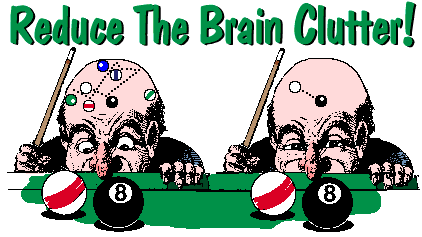

by Jim Meador
Everybody has been advised to "focus", and we all know what it means. But I am not sure we all know how, especially yours truly. I certainly make a conscious decision to do so, but somewhere, within the complicated electrical circuitry that keeps my brain from becoming a tar pit, something runs amuck. So I am apparently among those who find it difficult to keep my greater goals in front of the lesser.
I go to bed somewhere between 10 p.m. and midnight, and wake up between 2 and 4 in the morning. When I wake up I start thinking about all of the things I want to do, so I just get up. If I must be awake, I would rather be doing it than just thinking about it. About once a week I crash and sleep for 7 or 8 hours. I believe this side of my personality is reflected in my pool game. I have a hard time focusing on the object ball, because I am too busy thinking ahead of myself. I try to make all of the necessary speed and spin decisions before I bend over the table, but for some reason I still start rethinking my decision alter I start aiming. Not good at all and something I warn students against.
"So", you ask, Why don't you take your own advice?" My response: "Duhhhhhhh...I'm not home at the moment. I'm somewhere in space trying to determine how many planets will be consumed by the sun when it becomes a red giant, and if the scientists are right in their calculations giving us only 4 million years to enjoy our own flesh on the rare side.
What was this about? Oh, yeah--brain clutter.
The stupid little cartoons above say it all. Focus is nothing more than reducing the amount of information you expect your brain to deal with to one task: making the object ball. When you are ready to shoot, it is too late to ask questions, unless you stand up for another look.
The wisdom behind that quote escaped me for many years. It wasn't until I was old enough to enjoy scotch on the rocks that I finally caught on. Somehow our little brains can distinguish between what's important and what's not. Of course, it doesn't know the difference until we have assigned priorities to what is stored. If we use something we've learned often enough, the brain will hang on to the information. If not, most is trashed over a period of time. Think about your years in high school or college. If you had to take your tests over again, what would you remember? Not much. But the details we are expected to remember for a test are not the important things. What is important is the core--the theories or history behind the details.
It doesn't take a physicist to shift a car into reverse, and expect it the back up. Likewise, it shouldn't take a scientist to expect a cue ball to back up with reverse english. A mechanic might be able to explain how all of the gears and gizmos work to put the car in reverse, but his ability to shift into reverse when he is behind the wheel is no better than yours. His advantage becomes apparent when something goes wrong. He can fix it. And it isn't necessary for him to remember where every nut and bolt is to do so. He knows the theory. He is educated, at least regarding cars.
Pool is no different. The more you know about the physics of the game, the better your position to correct problems. You can't possible remember all of the details, but you won't forget the theory. When you forget all you've learned, the education remains.
Read this newsletter, and practice that you believe might be of value. But when you are playing in a tournament or league match, forget the details and trust in your education.
So, what is the connection between this and "Brain Clutter"?
I believe they are really one in the same, except one deals with the short term clutter we must consciously deal with during a game, and the other references long term clutter that the brain trashes by default if not used frequently.
So, immerse yourself in everything you can find on pool. Read the publications. Get into the rec.sport.billiard newsgroup. Take lessons. Play in as many tournaments as possible--and then, forget the details. Enjoy your education--and your status as a top player. As for my game, I must assume I am where I really want to be at this stage of my life. I can still play a mean game then I stop thinking. In fact, everything is easier when I don't think.
Is that a tar pit I smell?